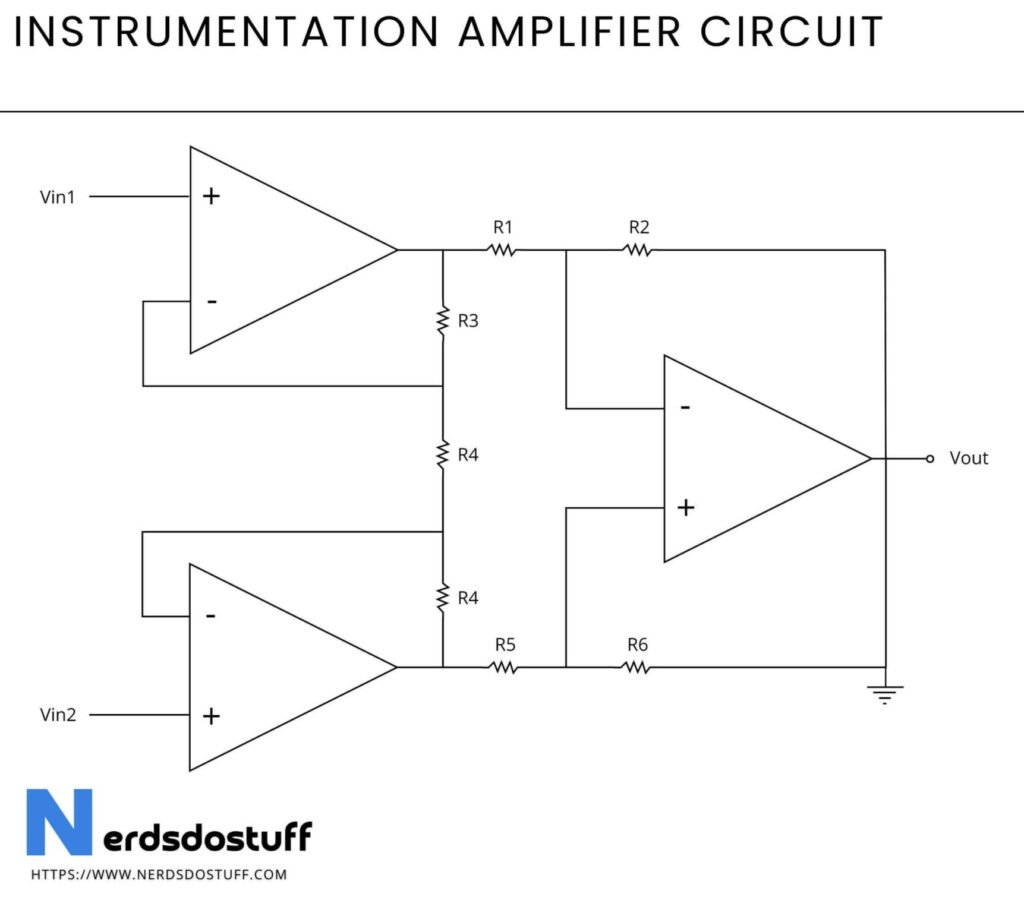What is Instrumentation Amplifier ?
An instrumentation amplifier is a type of electronic amplifier specifically designed for precise and accurate amplification of low-level signals, often used in measurement and sensor applications. It consists of multiple operational amplifiers (op-amps) and precision resistors configured to provide high input impedance, low output impedance, and excellent common-mode rejection ratio (CMRR). Instrumentation amplifiers are characterized by their high gain, high accuracy, and ability to handle differential input signals while rejecting common-mode noise. They are commonly used in instrumentation and measurement systems, biomedical devices, data acquisition systems, and sensor interfacing applications where accurate signal amplification and noise rejection are critical.
Instrumentation Amplifier Circuit

Working of Instrumentation Amplifier
An instrumentation amplifier works by amplifying the voltage difference between two input signals while rejecting any signals that are common to both inputs, thereby providing high-precision amplification of small differential signals. It typically consists of three operational amplifiers (op-amps) arranged in a configuration that amplifies the voltage difference between the two input signals. Precision resistors are used to set the gain of the amplifier, and feedback loops are employed to maintain high input impedance and low output impedance. The differential input signals are amplified while common-mode signals, such as noise or interference, are rejected due to the amplifier’s high common-mode rejection ratio (CMRR).
Characteristics of Instrumentation Amplifier
| Characteristic | Description |
|---|---|
| Differential Amplification | Provides precise amplification of the voltage difference between two input signals, while rejecting common-mode signals. |
| High Input Impedance | Offers high input impedance, minimizing loading effects on the signal source and ensuring accurate signal measurement. |
| Low Output Impedance | Provides low output impedance, allowing the amplifier to drive loads without significant signal degradation. |
| High Common-Mode Rejection | Exhibits high common-mode rejection ratio (CMRR), attenuating noise and interference common to both input signals. |
| Adjustable Gain | Typically offers adjustable gain through precision resistors, allowing for customization based on application requirements. |
| Stability | Maintains stability and accuracy over a wide range of operating conditions, ensuring reliable performance. |
| Wide Bandwidth | Offers a wide bandwidth to accurately amplify signals across a broad frequency range. |
| Low Offset Voltage | Features low offset voltage, minimizing errors in signal measurement and ensuring accurate results. |
| Applications | Widely used in measurement and sensor applications, data acquisition systems, medical instrumentation, and more. |
Applications of Instrumentation Amplifier
- Biomedical Instrumentation: Instrumentation amplifiers are extensively used in biomedical instrumentation for measuring biological signals such as electrocardiograms (ECG), electromyograms (EMG), and electroencephalograms (EEG). They provide high-precision amplification of weak physiological signals while rejecting common-mode noise, enabling accurate monitoring and diagnosis of medical conditions.
- Strain Gauge Amplification: Instrumentation amplifiers are employed in strain gauge amplification circuits for measuring mechanical strain or deformation in structures. They provide precise amplification of the small voltage changes produced by strain gauges, allowing for accurate measurement of force, pressure, or weight in applications such as load cells, force sensors, and pressure transducers.
- Data Acquisition Systems: Instrumentation amplifiers play a crucial role in data acquisition systems for measuring and recording analog signals from sensors and transducers. They provide accurate amplification and conditioning of sensor signals, ensuring reliable and precise measurement of physical parameters in industrial, automotive, and research applications.
- Temperature Measurement: Instrumentation amplifiers are used in temperature measurement circuits for amplifying the small voltage signals generated by temperature sensors such as thermocouples, RTDs (resistance temperature detectors), and thermistors. They enable accurate measurement of temperature variations in applications such as environmental monitoring, HVAC (heating, ventilation, and air conditioning), and industrial process control.
- Audio Signal Processing: Instrumentation amplifiers are employed in audio signal processing applications for amplifying and conditioning audio signals with high fidelity and low distortion. They are used in audio mixers, preamplifiers, and microphone preamps to provide precise amplification of audio signals while maintaining high signal integrity and dynamic range.
- Bridge Sensor Interfaces: Instrumentation amplifiers are commonly used in bridge sensor interface circuits for amplifying and conditioning signals from bridge-based sensors such as pressure sensors, force sensors, and load cells. They provide accurate amplification and offset adjustment, enabling precise measurement of physical parameters in industrial, aerospace, and automotive applications.




